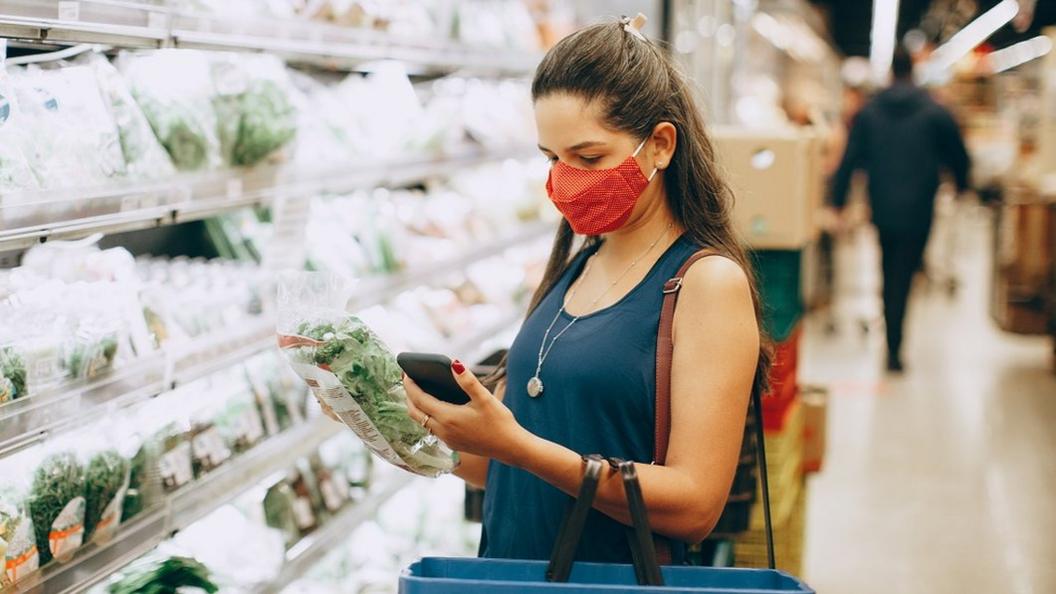Food price inflation sees traders and charities struggle
- Published
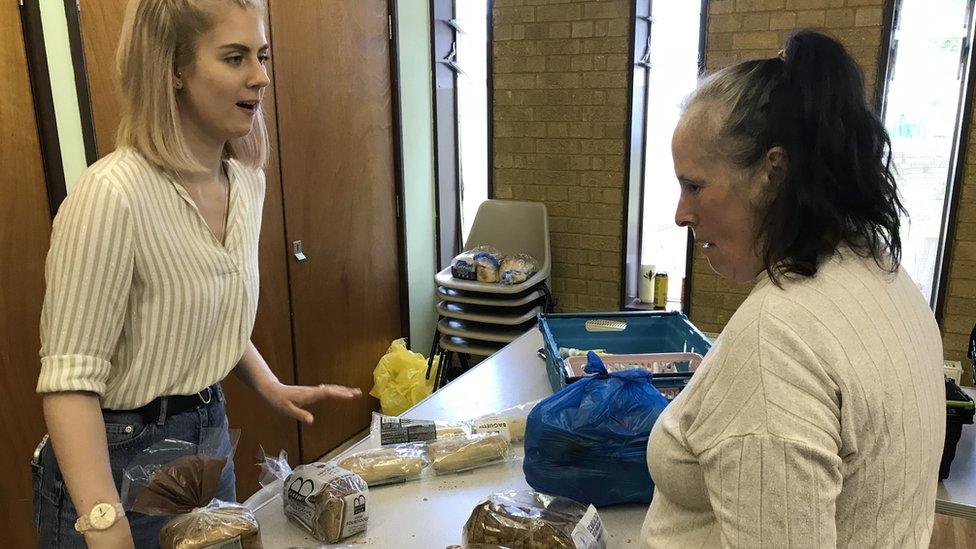
Demand for parcels of basics has doubled at the Hope Centre food bank in Northampton
The Bank of England has warned inflation might reach 11% within months, as prices put pressure on household budgets. Food businesses have seen a rapid escalation in prices, while food bank charities say donations are down as a result. So how is everyone managing?

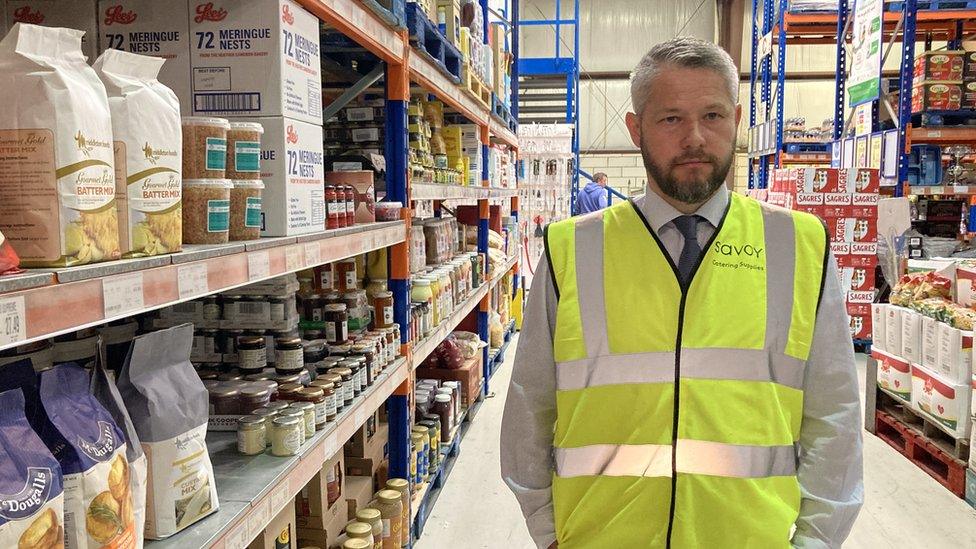
Mark Harris of Savoy Caterers says he has had to pass on price rises to his customers
Inflation stands at 9.1% but when it comes to food inflation, that appears to be much more brutal.
One food industry boss has warned that food prices could rise by up to 15% this year - and with average pay increases not keep pace, many people are noticing the impact to their budgets.
Savoy Catering, in Great Yarmouth, Norfolk, is a wholesale supplier to the offshore gas industry, hospitals, restaurants and care homes.
They are proving to be a useful barometer of changes in prices.
A year ago the wholesalers were selling catering bags of flour at £11 a bag; it now costs £17.
Eggs are also up from £14 to £30, and a box of butter was £34 but is now commanding £84.
Mark Harris, from the company, says "it's the hardest we've ever seen things - it's tough out there".
He says the "costs have risen so far that we've got no choice" but to pass the increases on to his customers, and agrees it would be by a considerable amount.
"Unfortunately the price hike from our suppliers has been so much that it's going to have a significant impact on the cost to our customers.
"Clearly no one's happy about the situation. Everyone's struggling nationally so it's difficult for everyone, but unfortunately we have no choice."
Mr Harris says help with fuel costs are needed. "With regards to fuel, obviously there's VAT and duty costs that we're not in control of. Surely the government can look at that and help small businesses?"
For its part the government says it is spending £37bn to help families as energy, food and fuel bills soar.

'Donations have really dropped'
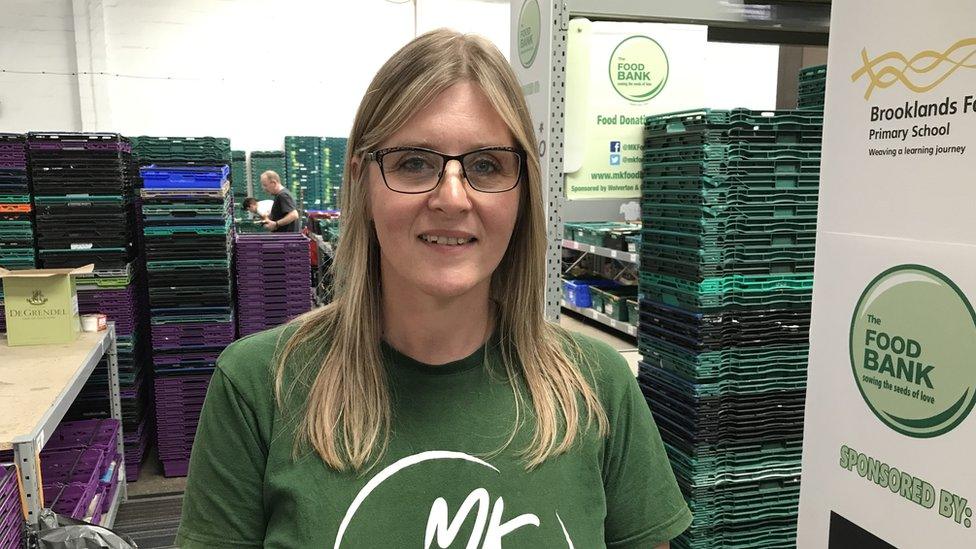
Louisa Hobbs of the MK Foodbank says it is seeing more people now than in the winter
The food price rises are affecting charities and foodbanks, which have seen demand for their services grow while donations fall off.
Louisa Hobbs says the rises have led to more demand for services at MK Foodbank.
The operations manager says the numbers coming in for food are like the numbers witnessed in January and February when heating bills are high.
"We don't normally see anything like this in June and we suspect that's due to rising prices of food and of course fuel energy, petrol prices etc."
The impact of increased prices has resulted in a rapid decline in donations.
"Our donations have really, really dropped. About two thirds of what is going out of the door is coming back in donations," she says.
The charity makes up the shortfall by buying food, which increases its costs "enormously".
She says the situation is not sustainable, adding: "We're not going to be able to carry on doing that forever.
"We're trying really hard to raise extra funds, to get people to donate one or two things more, but realistically if it carries on this way, we're not going to be able to help everybody."

'Massive food insecurity'
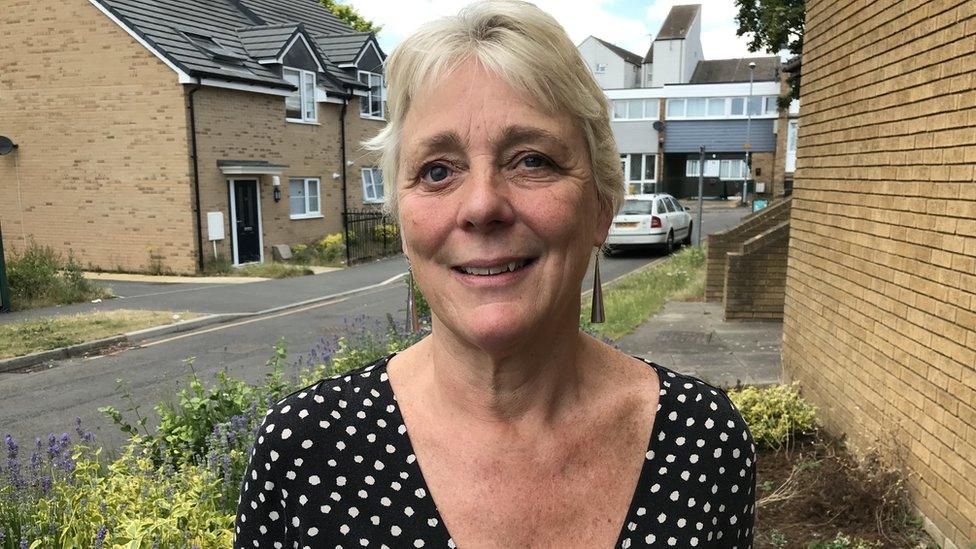
Miranda Wixon of Rural Community Larders says the demand for its services is massive
Miranda Wixon is volunteer coordinator of Rural Community Larders.
She says she works with other volunteer "food activists" in local communities in rural parts of Northamptonshire.
The organisation started out during the pandemic delivering 40,000 boxes of groceries to people in 91 villages.
"Coming out of lockdown we realised people were not able to source the food for lots and lots of reasons, probably for reasons that existed before lockdown," she says.
"A massive change has happened at a very, very fast rate.
"Families are finding it increasingly difficult to provide food for their children.
"It started off with schools telling us about breakfast needed and we provided food for schools to run breakfast clubs."
But Ms Wixon says pensioners living in rural communities are also struggling.
"If you have no transport to get anywhere and you have to fill up an oil tank to be able to heat your home, you just don't have enough money to buy food as well.
"Food insecurity is massive everywhere."

'Demand for help has doubled'
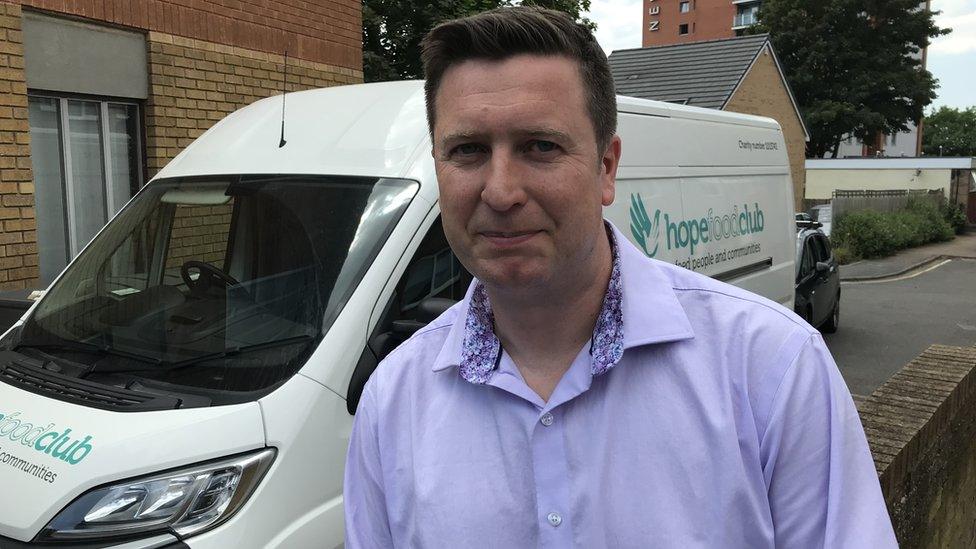
Alex Copeland of the Hope Food Club says the number of families it is helping has doubled in recent months
Alex Copeland is the chief executive of the Hope Centre, at a branch of the Salvation Army in Northampton.
The charity runs a social supermarket where people pay £10 a month for £100 of groceries.
It was set up as a charity for homeless people but since Covid has expanded to "help with the wider poverty agenda".
Mr Copeland says food provided tends to be essentials such as bread, eggs and milk, with lots of tins.
"Their money just doesn't go as far," he says.
"Demand has really grown over the last three months, week on week. At the Hope Centre we used to see about 100 families a week, we're now looking at nearer 200."
The charity used to deliver food across four areas and is looking to expand to 10 locations.
Mr Copeland says as an organisation they are "getting stretched so thin".
During Covid the council provided funding, which it distributed across all the food banks in Northamptonshire.
"That money has decreased dramatically and we need both money and food.
"We've seen less donations because everyone's money is so stretched.
"We've seen less money coming in from the council, but they're trying their best to help us."

Find BBC News: East of England on Facebook, external, Instagram, external and Twitter, external. If you have a story suggestion email eastofenglandnews@bbc.co.uk, external
- Published22 June 2022
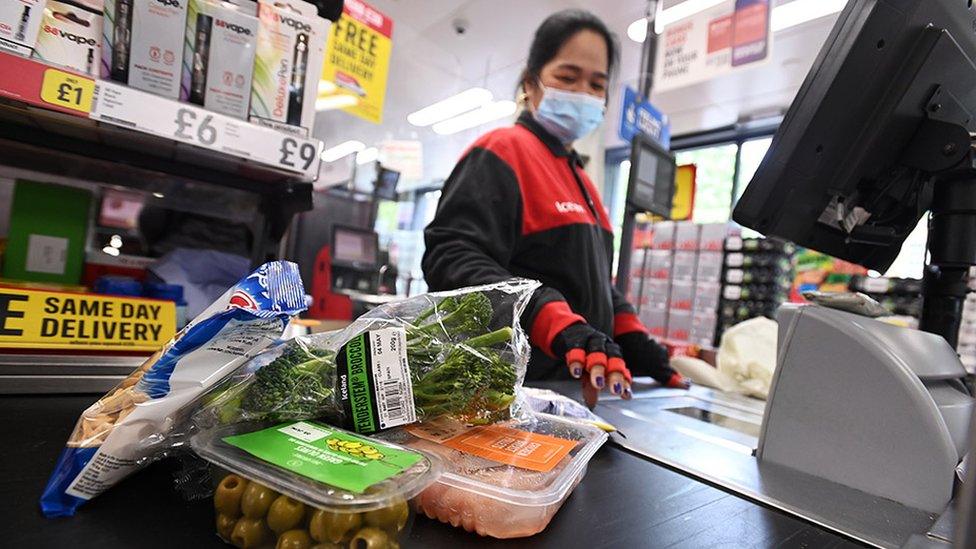
- Published18 June 2022
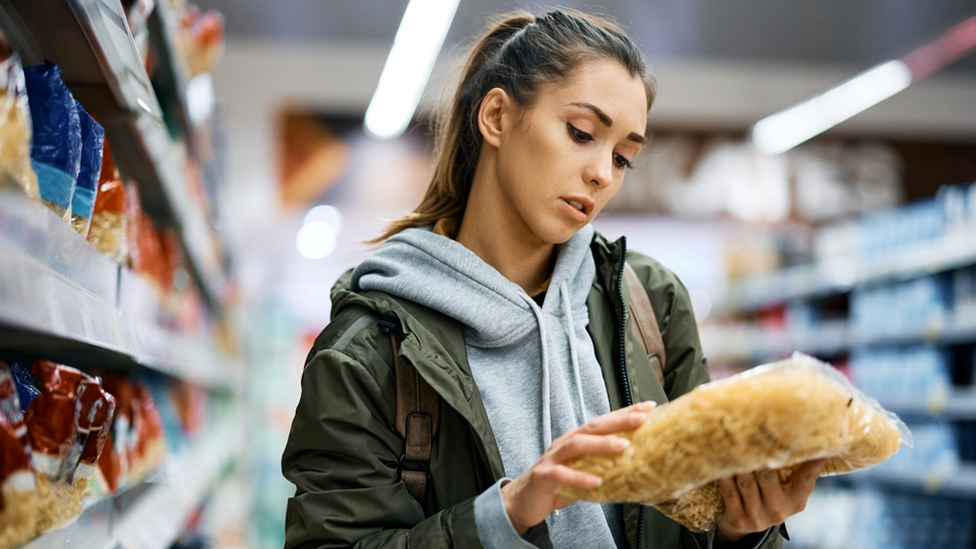
- Published15 June 2022
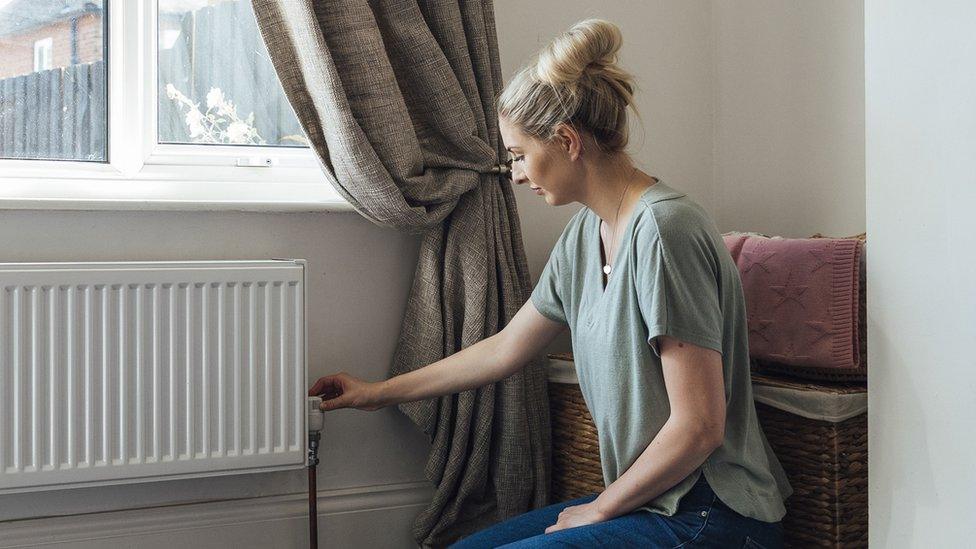
- Published14 March 2022
